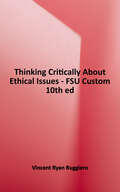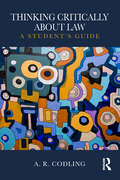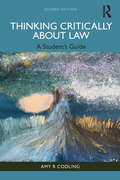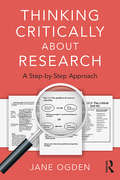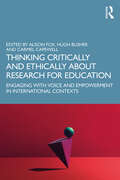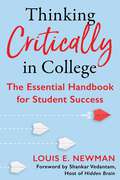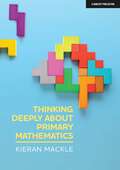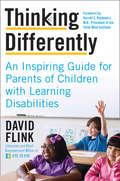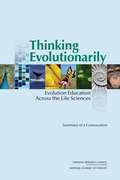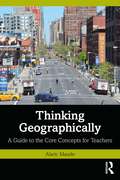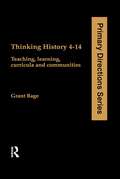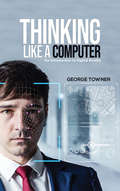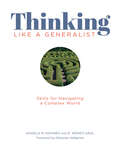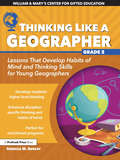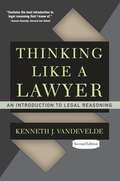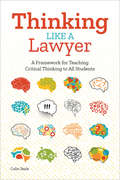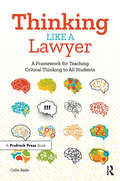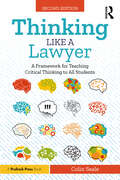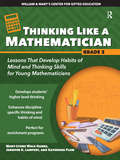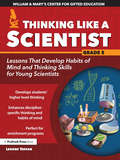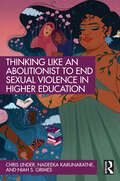- Table View
- List View
Thinking Critically About Ethical Issues - FSU Custom
by Vincent Ryan RuggieroThinking Critically About Ethical Issues encourages students to reason out for themselves the best answers to moral problems, rather than providing neat answers for students to swallow and regurgitate. Striking a balance between the theoretical and the practical, Ruggiero's text discusses the history of ethics, but its focus is on doing ethics to promote the development of critical thinking skills and to help students acquire confidence in their own judgment. The short chapter length allows students to spend less time reading and more time doing ethical analysis.
Thinking Critically About Law: A Student's Guide
by A. R. CodlingSo you’ve arrived at university, you’ve read the course handbook and you’re ready to learn the law. But is knowing the law enough to get you the very best marks? And what do your lecturers mean when they say you need to develop critical and analytical skills? When is it right to put your own views forward? What are examiners looking for when they give feedback to say that your work is too descriptive? This book explores what it means to think critically and offers practical tips and advice for students to develop the process, skill and ability of thinking critically while studying law. The book investigates the big questions such as: What is law? and What is ‘thinking critically’? How can I use critical thinking to get better grades in assessments? What is the role of critical thinking in the work place? These questions and more are explored in Thinking Critically About Law. Whether you have limited prior experience of critical thinking or are looking to improve your performance in assessments, this book is the ideal tool to help you enhance your capacity to question, challenge, reflect and problematize what you learn about the law throughout your studies and beyond.
Thinking Critically About Law: A Student's Guide
by Amy R CodlingYou arrive at university to embark upon your journey to ‘think like a lawyer’, but is simply knowing the law enough to gain you the best marks? What do you need to do, exactly, to achieve a first-class law degree and promising professional career? For top marks, what do your lecturers mean when they say you need to deepen your ‘critical analysis’ to answer assessment questions? When should you put your own viewpoints forward? When, and how, should you draw upon the work of others? What do your examiners mean when they give you feedback saying that your work is ‘too descriptive’? This book explores what it means to think critically and offers practical tips and advice for students to develop the process, skill and ability of thinking critically while studying law, as well as beyond that in the workplace.The second edition of Thinking Critically About Law utilises art, music, poetry and prose to explore essential questions about studying law and what it means to think critically, offering practical tips and advice for students looking to develop critical thinking skills in relation to law. Updates reflect seismic changes that have taken place both in law teaching and in society more generally. These include the Covid-19 pandemic, social movements sparked by the murders of murders of Sarah Everard and George Floyd, moves to decolonise the law curriculum and the introduction of the SQE qualification. There is also an innovative foreword by Professor Russell Sandberg, a new chapter on the topic of how to think critically during discussions, a new section on Thinking Critically About Law in the Future as well as a renewed emphasis on the health and well-being of students. Other student-focused resources will be available as support materials.Thinking Critically about Law is a crucial companion for those studying law at A-Level and undergraduate level, as well as being relevant to postgraduate students, newly qualified lawyers and tutors of law.
Thinking Critically about Research: A Step by Step Approach
by Jane OgdenWe live in an age of unprecedented access to information. The last decade has seen an exponential growth in data and material available, often at the touch of a button. However, this has also made it harder to discern between fact and fiction. What is real and what is fake? What should we believe and what should we reject? In an environment of information overload, a distrust of experts, the circulation of misinformation and false facts, and public debates based upon poor evidence, Thinking Critically About Research comes at a vital juncture. The book is designed to help readers develop a critical understanding of evidence and the ways in which evidence is presented, and to challenge the information they receive in both academic and non-academic sources. The author presents a step-by-step approach with a focus on knowing methods, culminating in a bespoke ‘critical tool kit’ which offers a practical checklist designed to be used when carrying out research. Also containing learning features including tasks and worked examples, drawing on real research studies, this is an essential resource for students and researchers, and those putting research into practice, who want to have better critical thinking skills.
Thinking Critically and Ethically about Research for Education: Engaging with Voice and Empowerment in International Contexts
by Alison FoxThinking Critically and Ethically about Research for Education draws on the experiences of a range of researchers in the discipline to explore the lived realities, including ethical and methodological complexities, involved in undertaking educational research. Using global case studies, this book examines the meaning of ethical research practice and raises questions about representation, power and empowerment in the field. It provides critical reflections from researchers, reviewing the methodologies they used in their studies and the ethical implications of these in theory and practice. The book highlights the various difficulties and realities present in education research and provides researchers with the tools necessary for refining their skills and understanding ethical research methodologies. The chapters reflect authors’ responses to the following questions: What values prompted you to do this work and how did you share these with participants? What were the ethical considerations raised beforehand and how were these tackled in terms of meeting obligations (including to ERBs), maximising benefits and dealing with issues arising during the study and through to publication? What does ‘empowerment’ and/or ‘voice’ mean to you as a researcher and how did you express this to your participants? In what ways were the participants given opportunities to be empowered in or through your study? With critical discussions on ethics and research practices in education research, this book is ideal for student, novice and experienced researchers looking to undertake ethical education research.
Thinking Critically in College: The Essential Handbook for Student Success
by Louis NewmanFinally, a college prep book that actually prepares students for college! Almost all first-year college students discover that college courses are more academically challenging than they expected, and certainly harder than classes in high school. Professors expect students not just to absorb material, but to analyze and synthesize it, consider multiple perspectives, evaluate conflicting evidence, and then apply what they've learned in new contexts.Thinking Critically in College explains how to do all this and more.Louis E. Newman draws on decades of experience as a professor at Carleton College and Dean of Academic Advising and Associate Vice Provost for Undergraduate Education at Stanford, offering the guidance you need to succeed both in college and in life post-graduation. Unique among college prep books, Thinking Critically in College builds on the latest research in learning, spells out the key critical thinking skills you need, shows you how to tackle actual college assignments, and provides exercises throughout to reinforce the lessons.Written in a personal, engaging style, Thinking Critically in College explains how to do the work your professors will require—exactly the preparation you need, no matter what your academic background. Practical, accessible, comprehensive, and interactive, Thinking Critically in College is the definitive guide, not only for those in college or headed there, but for everyone who needs a refresher on thinking clearly.
Thinking Deeply About Primary Mathematics
by Kieran MackleThinking Deeply about Primary Mathematics is a comprehensive exploration of the ideas, theories and practices of most value to beginning teachers, as well as any teacher with the desire to improve their practice.Immediately applicable in the classroom and supported by robust analysis of research into mathematics teaching, this book is designed to provide inspiration for specialised teaching assignments with the power to enhance both the rate and quality of your professional development journey.Through the use of expertly crafted explanations, examples and tasks, each chapter will guide you step by step through the otherwise intimidating world of primary mathematics teaching.This book is perfect for teachers driven to become highly effective practitioners. It also serves as a blueprint for school leaders looking to develop the abilities of their teachers and ensure the highest quality mathematics education for all children.Teacher proficiency is a vast uneven continuum but in taking time to think deeply about primary mathematics we allow ourselves with the opportunity to build a solid base from which a successful, fulfilling career can be constructed.The insight and expertise provided by Thinking Deeply About Primary Mathematics is essential for anyone involved in the teaching of mathematics.
Thinking Deeply About Primary Mathematics
by Kieran MackleThinking Deeply about Primary Mathematics is a comprehensive exploration of the ideas, theories and practices of most value to beginning teachers, as well as any teacher with the desire to improve their practice.Immediately applicable in the classroom and supported by robust analysis of research into mathematics teaching, this book is designed to provide inspiration for specialised teaching assignments with the power to enhance both the rate and quality of your professional development journey.Through the use of expertly crafted explanations, examples and tasks, each chapter will guide you step by step through the otherwise intimidating world of primary mathematics teaching.This book is perfect for teachers driven to become highly effective practitioners. It also serves as a blueprint for school leaders looking to develop the abilities of their teachers and ensure the highest quality mathematics education for all children.Teacher proficiency is a vast uneven continuum but in taking time to think deeply about primary mathematics we allow ourselves with the opportunity to build a solid base from which a successful, fulfilling career can be constructed.The insight and expertise provided by Thinking Deeply About Primary Mathematics is essential for anyone involved in the teaching of mathematics.
Thinking Differently
by David FlinkWhen parents are told their child has a learning disability, they need more information. Thinking Differently is just the resource to meet that need. David Flink, leader of Eye to Eye, a national mentoring program for children with learning differences, explains each learning disability in layman's terms to prepare parents to speak knowledgeably with teachers about their child's specific challenges. Thinking Differently will not overwhelm parents with legal jargon, but it will guide them through what laws are on their side and what they can insist that schools provide for their child. With compassion and hope, Flink describes the importance of testing and diagnosis to equip parents with the tools they need to advocate authoritatively on their child's behalf and to seek the most effective accommodations--from technology to extra time and medication--to guarantee that their child succeeds in school and life. In this eye-opening book, David Flink helps parents understand what their child is experiencing. He also emphasizes the importance of maintaining and building children's self-esteem, by helping them discover inner gifts and special talents and realize they are as smart as anyone--even if they think differently.
Thinking Evolutionarily
by National Research Council Steve Olson Division on Earth and Life Studies Board on Life Sciences Planning Committee on Thinking Evolutionarily: Making Biology Education Make Sense Jay B. LabovEvolution is the central unifying theme of biology. Yet today, more than a century and a half after Charles Darwin proposed the idea of evolution through natural selection, the topic is often relegated to a handful of chapters in textbooks and a few class sessions in introductory biology courses, if covered at all. In recent years, a movement has been gaining momentum that is aimed at radically changing this situation. On October 25-26, 2011, the Board on Life Sciences of the National Research Council and the National Academy of Sciences held a national convocation in Washington, DC, to explore the many issues associated with teaching evolution across the curriculum. Thinking Evolutionarily: Evolution Education Across the Life Sciences: Summary of a Convocation summarizes the goals, presentations, and discussions of the convocation. The goals were to articulate issues, showcase resources that are currently available or under development, and begin to develop a strategic plan for engaging all of the sectors represented at the convocation in future work to make evolution a central focus of all courses in the life sciences, and especially into introductory biology courses at the college and high school levels, though participants also discussed learning in earlier grades and life-long learning. Thinking Evolutionarily: Evolution Education Across the Life Sciences: Summary of a Convocation covers the broader issues associated with learning about the nature, processes, and limits of science, since understanding evolutionary science requires a more general appreciation of how science works. This report explains the major themes that recurred throughout the convocation, including the structure and content of curricula, the processes of teaching and learning about evolution, the tensions that can arise in the classroom, and the target audiences for evolution education.
Thinking Geographically: A Guide to the Core Concepts for Teachers
by Alaric MaudeThis book explains how the concepts of geography can teach young people to think geographically, deeply and ethically. Thinking Geographically demonstrates how the concepts of place, space, environment and interconnection teach students new ways of perceiving and understanding the world, the concepts of scale and time teach them ways of analysing the world, while the concepts of sustainability and wellbeing show them how to evaluate and reflect on what they observe, and all eight concepts develop their higher order and critical thinking. To further support teachers, this book includes a chapter on how to teach for conceptual understanding, as well as two chapters that illustrate the application of geographical thinking to an understanding of the effects of land cover change and the problem of regional inequality. Rich with practical examples, this book is an essential resource for geography teachers, whether already teaching or studying to become one, and for those who teach therm.
Thinking Historically
by Stephane LevesqueTwo simple but profound questions have preoccupied scholars since the establishment of history education over a century ago: what is historical thinking, and how do educators go about teaching it? In Thinking Historically, Stéphane Ltévesque examines these questions, focusing on what it means to think critically about the past. As students engage in a new century already characterized by global instability, uncertainty, and rivalry over claims about the past, present, and future, this study revisits enduring questions and aims to offer new and relevant answers.Drawing on a rich collection of personal, national, and international studies in history education, Ltévesque offers a coherent and innovative way of looking at how historical expertise in the domain intersects with the 'pedagogy of history education.' Thinking Historically provides teacher educators, and all those working in the field of history education, ways of rethinking their practice by presenting some of the benchmarks, in terms of procedural concepts, of what students ought to learn and do to become more critical historical actors and citizens.As questions regarding history education compel educators with greater force than ever, this study explores different ways of approaching and engaging with the discipline in the twenty-first century.
Thinking History 4-14: Teaching, Learning, Curricula and Communities (Primary Directions Ser.)
by Dr Grant Bage Grant BageIn this book the author looks at the past, present and the future of history teaching in primary schools in an attempt to provide a practical framework for teachers. Section one reviews relevant literature with an aim to clarify the dilemmas and advance present thinking and practice in history teaching in primary schools. Section two offers case studies, curriculum materials and designs, teaching ideas and methods, teacher-development and curriculum development materials, at the same time as tying it in to the existing knowledge-base. Section three considers the 'perennial dilemmas' for school history in the 21st century, including: how can history survive in an increasingly over-crowded and competitive school curriculum? How can history be harnessed to improvements in literacy and numeracy? What should the primary history curriculum contain? How can IT secure easier access to historical information and evidence?
Thinking Like a Computer: An Introduction to Digital Reality
by George TownerThinking Like a Computer is the result of a detailed 30-year study of how computers imitate life.Although they are machines, computers are designed to act like human beings. Software is specifically created to help accomplish human-like tasks and to be understood in human terms. Yet unlike human life, computer operations can be analyzed in detail because we build the machines that accomplish them and we know the design decisions that make them work.With every choice made during the evolution of digital technology, computer architects have intuitively or consciously incorporated truths of human functioning into their designs.Thinking Like a Computer is based on these truths, assembling them into a new explanation of human knowledge. In addition, it provides insights into the foundations of theoretical science because much of digital technology is dedicated to creating new realities.
Thinking Like a Generalist: Skills for Navigating a Complex World
by Angela Kohnen Wendy SaulWhat can we teach kids today that will have utility ten or fifteen years from now? Angela Kohnen and Wendy Saul propose an approach to information literacy that goes beyond the teaching of discreet, easily outdated skills. Instead they use activity to help students build identities as curious individuals empowered to ask their own questions and able to navigate their information-filled world in pursuit of credible answers. A generalist is curious, open-minded, skeptical, and persistent in their quest for information. Thinking Like a Generalist: Skills for Navigating a Complex World demonstrates what it means to take a generalist stance in instruction and provides a set of teaching tools to be able to pass those skills to students'sskills that will transfer beyond the walls of the classroom. Inside you'll find the following: A thorough introduction to what it means to be a generalist, and how to develop the practices and tools that help generalists navigate the world we live inA focus on the teacher becoming a generalist and tips for modeling those practices in the classroomDetailed instructions on how to write a unit of study that emphasizes generalist literacy skills and includes an overview and examples of five different unitsHow to use the authors' read-aloud-think-aloud strategy to orient students to generalist tools and practicesThe ideas, strategies, and examples Thinking Like a Generalist will give you the tools to think like a generalist and then pass that knowledge on to your students, guiding them to become inquisitive, lifelong learners and preparing them for a future that we can't yet imagine.
Thinking Like a Geographer: Lessons That Develop Habits of Mind and Thinking Skills for Young Geographers in Grade 2
by Rebecca M. BurleyThinking Like a Geographer focuses on high-interest, career-related topics in the elementary curriculum related to geography. Students will explore interdisciplinary content, foster creativity, and develop higher order thinking skills with activities aligned to relevant content area standards. Students will develop and practice geography skills, such as reading and creating maps, graphs, and charts; examining primary and secondary sources; and thinking spatially on a variety of scales. Thinking Like a Geographer reflects key emphases of curricula from the Center for Gifted Education at William & Mary, including the development of process skills in various content areas and the enhancement of discipline-specific thinking and habits of mind through hands-on activities. Grade 2
Thinking Like a Lawyer
by Kenneth J. VandeveldeIn this book, Vandevelde (law, Thomas Jefferson School of Law) attempts to identify, systematically analyze, and simplify into applicable terms the characteristics of legal thought and reasoning. Twelve chapters are organized into three sections: basic legal reasoning, reasoning with policies, and perspectives on legal reasoning. Chapters cover topics like analyzing the law, policy analysis, synthesis, and application, and contemporary perspectives on legal reasoning. The second edition includes a new appendix describing the way legal reasoning is taught in law school and how students can use this text to reinforce their reasoning skills. Annotation ©2011 Book News, Inc. , Portland, OR (booknews. com)
Thinking Like a Lawyer
by Kenneth J. VandeveldeWhen Kenneth J. Vandevelde's Thinking Like a Lawyer first published, it became an instant classic, considered by many to be the gold standard introduction to legal reasoning. In this long-awaited second edition, intended for fans of the original and a new generation of lawyers, Vandevelde expands his classic work with useful revisions and updates throughout. Law students, law professors, and lawyers frequently refer to the process of "thinking like a lawyer," but attempts to analyze in any systematic way what is meant by that phrase are rare. Vandevelde defines this elusive phrase and identifies the techniques involved in thinking like a lawyer. Unlike most legal writings, plagued by difficult, virtually incomprehensible language, Vandevelde's work is accessible and clearly written. The second edition features new sections on the legislative process--describing step-by-step how legislation is enacted--and the judicial process--describing step-by-step how a case is litigated in court. Other new sections address the significance of dissenting and concurring opinions as well as the role of cognitive bias in factual determinations and on persuading a jury, on burdens of proof, and on presumptions. A new chapter provides contemporary perspectives on legal reasoning, which includes new material on feminist legal theory, critical race theory, and the economics of law. A new appendix is intended for prospective law students, explaining how readers can use the techniques in the book to help them excel in law school. Vandevelde's Thinking Like a Lawyer will help students, lawyers, and lay readers alike gain important insight into a well-developed and valuable way of thinking. Professors and students will find the book useful in almost any introductory law course at the graduate level and in advanced undergraduate courses on law.
Thinking Like a Lawyer
by Kenneth J. VandeveldeWhen Kenneth J. Vandevelde's Thinking Like a Lawyer first published, it became an instant classic, considered by many to be the gold standard introduction to legal reasoning. In this long-awaited second edition, intended for fans of the original and a new generation of lawyers, Vandevelde expands his classic work with useful revisions and updates throughout. Law students, law professors, and lawyers frequently refer to the process of "thinking like a lawyer," but attempts to analyze in any systematic way what is meant by that phrase are rare. Vandevelde defines this elusive phrase and identifies the techniques involved in thinking like a lawyer. Unlike most legal writings, plagued by difficult, virtually incomprehensible language, Vandevelde's work is accessible and clearly written. The second edition features new sections on the legislative process--describing step-by-step how legislation is enacted--and the judicial process--describing step-by-step how a case is litigated in court. Other new sections address the significance of dissenting and concurring opinions as well as the role of cognitive bias in factual determinations and on persuading a jury, on burdens of proof, and on presumptions. A new chapter provides contemporary perspectives on legal reasoning, which includes new material on feminist legal theory, critical race theory, and the economics of law. A new appendix is intended for prospective law students, explaining how readers can use the techniques in the book to help them excel in law school. Vandevelde's Thinking Like a Lawyer will help students, lawyers, and lay readers alike gain important insight into a well-developed and valuable way of thinking. Professors and students will find the book useful in almost any introductory law course at the graduate level and in advanced undergraduate courses on law.
Thinking Like a Lawyer: A Framework for Teaching Critical Thinking to All Students
by Colin SealeCritical thinking is the essential tool for ensuring that students fulfill their promise. But, in reality, critical thinking is still a luxury good, and students with the greatest potential are too often challenged the least. Thinking Like a Lawyer: Introduces a powerful but practical framework to close the critical thinking gap. Gives teachers the tools and knowledge to teach critical thinking to all students. Helps students adopt the skills, habits, and mindsets of lawyers. Empowers students to tackle 21st-century problems. Teaches students how to compete in a rapidly changing global marketplace. Colin Seale, a teacher-turned-attorney-turned-education-innovator and founder of thinkLaw, uses his unique experience to introduce a wide variety of concrete instructional strategies and examples that teachers can use in all grade levels and subject areas. Individual chapters address underachievement, the value of nuance, evidence-based reasoning, social-emotional learning, equitable education, and leveraging families to close the critical thinking gap.
Thinking Like a Lawyer: A Framework for Teaching Critical Thinking to All Students
by Colin SealeCritical thinking is the essential tool for ensuring that students fulfill their promise. But, in reality, critical thinking is still a luxury good, and students with the greatest potential are too often challenged the least. Thinking Like a Lawyer:Introduces a powerful but practical framework to close the critical thinking gap.Gives teachers the tools and knowledge to teach critical thinking to all students.Helps students adopt the skills, habits, and mindsets of lawyers. Empowers students to tackle 21st-century problems.Teaches students how to compete in a rapidly changing global marketplace.Colin Seale, a teacher-turned-attorney-turned-education-innovator and founder of thinkLaw, uses his unique experience to introduce a wide variety of concrete instructional strategies and examples that teachers can use in all grade levels and subject areas. Individual chapters address underachievement, the value of nuance, evidence-based reasoning, social-emotional learning, equitable education, and leveraging families to close the critical thinking gap.
Thinking Like a Lawyer: A Framework for Teaching Critical Thinking to All Students
by Colin SealeCritical thinking is the essential tool for ensuring that students fulfill their promise. But, in reality, critical thinking is still a luxury good, and students with the greatest potential are too often challenged the least. This best-selling book: Introduces a powerful but practical framework to close the critical thinking gap Gives teachers the tools and knowledge to teach critical thinking to all students Empowers students to tackle 21st-century problems Teaches students how to compete in a rapidly changing global marketplace Colin Seale, a teacher-turned- attorney-turned-education-innovator and founder of thinkLaw, uses his unique experience to introduce a wide variety of concrete instructional strategies and examples that teachers can use in all grade levels. Individual chapters address underachievement, the value of nuance, evidence-based reasoning, social-emotional learning, equitable education, and leveraging families to close the critical thinking gap. In addition to offering examples for Math, Science, ELA, and Social Studies, this timely, updated second edition adds a variety of new examples and applications for Physical Education, Fine Arts, Foreign Language, and Career and Technical Education.
Thinking Like a Mathematician: Lessons That Develop Habits of Mind and Thinking Skills for Young Mathematicians in Grade 3
by Mary-Lyons Walk Hanks Jennifer K. Lampert Katherine PlumThinking Like a Mathematician focuses on high-interest, career-related topics in the elementary curriculum related to mathematics. Students will explore interdisciplinary content, foster creativity, and develop higher order thinking skills with activities aligned to relevant content area standards. Students will engage in exploration activities, complete mathematical challenges, and then apply what they have learned by making real-world connections. Thinking Like a Mathematician reflects key emphases of curricula from the Center for Gifted Education at William & Mary, including the development of process skills in various content areas and the enhancement of discipline-specific thinking and habits of mind through hands-on activities. Grade 3
Thinking Like a Scientist: Lessons That Develop Habits of Mind and Thinking Skills for Young Scientists in Grade 5
by Lenore TeevanThinking Like a Scientist focuses on high-interest, career-related topics in the elementary curriculum related to science. Students will explore interdisciplinary content, foster creativity, and develop higher order thinking skills with activities aligned to relevant content area standards. Through inquiry-based investigations, students will explore what scientists do, engage in critical thinking, learn about scientific tools and research, and examine careers in scientific fields. Thinking Like a Scientist reflects key emphases of curricula from the Center for Gifted Education at William & Mary, including the development of process skills in various content areas and the enhancement of discipline-specific thinking and habits of mind through hands-on activities. Grade 5
Thinking Like an Abolitionist to End Sexual Violence in Higher Education
by Chris Linder Nadeeka Karunaratne Niah S. GrimesThis book brings abolitionist ideas into higher education contexts as a way to address the problem of sexual violence on college campuses. Despite college and university administrators spending millions of dollars each year to address sexual violence among students, rates of sexual violence have not budged. This cutting-edge book examines the histories of policies enacted to address sexual violence on campuses, drawing parallels between campus movements and mainstream feminist movements, describes contexts contributing to ongoing harm and violence among students with minoritized identities, and explores healing through community accountability processes. Thinking Like an Abolitionist to End Sexual Violence in Higher Education provides promising strategies for leaders in higher education to consider, including embracing mistakes, moving through fear, facilitating individual and collective healing, and employing transformative approaches to accountability. With suggestions for engaging in reflection and specific calls to action, practitioners, researchers, activists, educators, and policymakers alike will find this resource to be a transformative keystone text.
